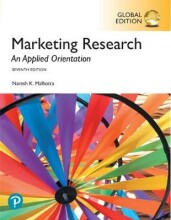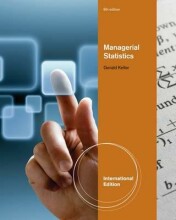Exploratory Research Design: Qualitative Research
23 important questions on Exploratory Research Design: Qualitative Research
How do you call an unstructured, exploratory research methodology based on small samples that provides insights and understanding of the problem setting?
How do you call a research methodology that seeks to quantify the data and, typically, applies some form of statistical analysis?
How do you call one type of qualitative research in which the purposes of the project are disclosed to the respondent or are apparent, given the nature of the interview?
- Higher grades + faster learning
- Never study anything twice
- 100% sure, 100% understanding
How do you call an interview conducted by a trained moderator among a small group of respondents in an unstructured and natural manner?
How do you call a focus group technique using a telecommunications network?
How do you call an unstructured, direct, personal interview in which a single respondent is probed by a highly skilled interviewer to uncover underlying motivations, beliefs, attitudes, and feelings on a topic?
How do you call a technique for conducting depth interviews in which a line of questioning proceeds from product characteristics to user characteristics?
How do you call a type of depth interview that attempts to locate secret sore spots related to felt personal concerns deeply?
How do you call a technique for conducting depth interviews in which the symbolic meanings of objects are analysed by comparing them with their opposites?
How do you call an inductive and more structured approach in which each subsequent depth interview is adjusted based on the cumulative findings from previous depth interviews to develop general concepts or theories?
How do you call an interview in which a respondent is placed in a decision-making situation and asked to verbalise the process and the activities that he or she would undertake to make the decision?
How do you call an unstructured and indirect form of questioning that encourages the respondents to project their underlying motivations, beliefs, attitudes, or feelings regarding the issues of concern?
How do you call a projective technique in which respondents are presented with a list of words, one at a time, and after each word, they are asked to give the first word that comes to mind?
How do you call a projective technique that requires the respondent to complete an incomplete stimulus situation?
How do you call a projective technique in which respondents are presented with several incomplete sentences and asked to complete them?
How do you call a projective technique in which the respondents are provided with part of a story and required to give the conclusion in their own words?
How do you call a projective technique in which the respondent is required to construct a response in the form of a story, dialogue, or description?
How do you call a projective technique in which cartoon characters are shown in a specific situation related to the problem when the respondents are asked to indicate the dialogue that one cartoon character might make in response to the comments of another character?
How do you call projective techniques in which the respondent is presented with a verbal or visual situation and asked to relate the feelings and attitudes of other people to the situation?
How do you call a projective technique in which the respondent is presented with a verbal or visual situation and asked to relate the beliefs and attitudes of a third person to the situation?
What are the 11 key characteristics of a focus group?
O utline prepared for discussion
C haracteristics of the moderator
U nstructured
S ize:8-12
G roup composition: homogenous
R ecorded: audio and video recording
O bservation: one-way mirror
U ndisguised
P hisical setting: relaxed
S everal sessions needed: 1-3 hours each
What are the five main features of a depth interview?
E ach respondent individually interviewed
P robe the respondent
T alented interviewer required
H idden motives may be uncovered
What are the 10 main characteristics of projective techniques?
R elationship: association techniques
O vercome respondent's unwillingness or inhability to answer
J udgment required in interpretation of reponses
E xpressive techniques
C onstruction, completion techniques
T hematic: themes are elicited
I indirect
V ague situations are used as stimuli
E xploratory in nature
The question on the page originate from the summary of the following study material:
- A unique study and practice tool
- Never study anything twice again
- Get the grades you hope for
- 100% sure, 100% understanding































